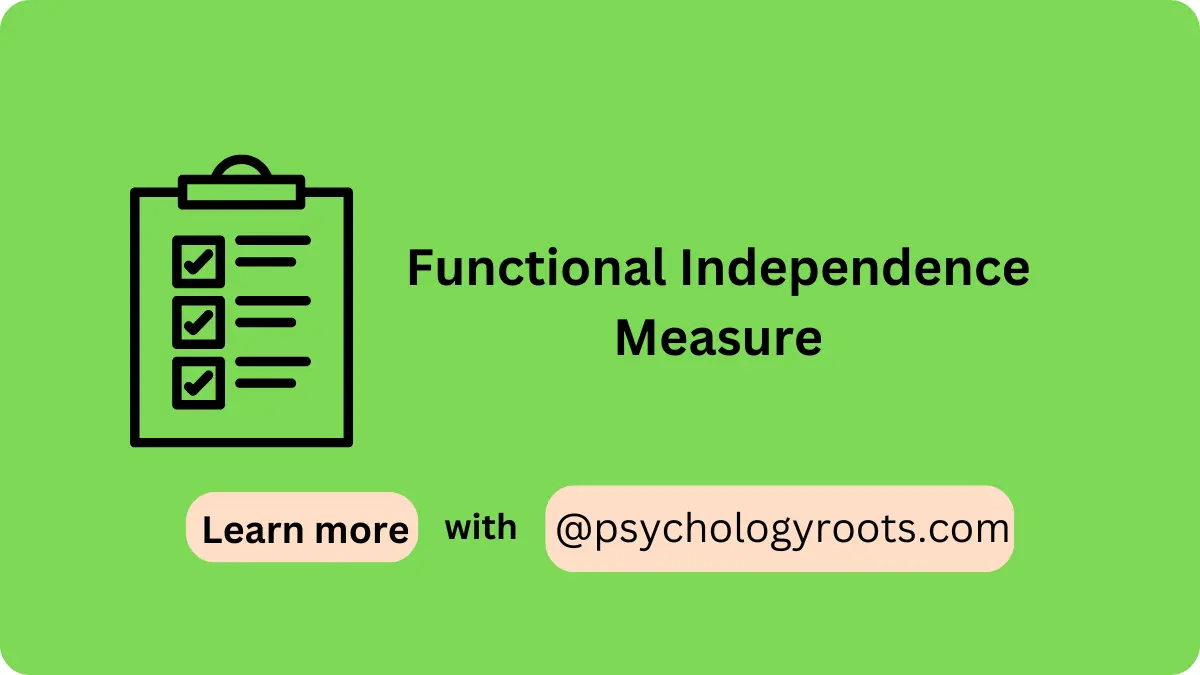Table of Contents
Functional Independence Measure
Here in this post, we are sharing the “Functional Independence Measure”. You can read psychometric and Author information. We have thousands of Scales and questionnaires in our collection (See Scales and Questionnaires). You can demand us any scale and questionnaires related to psychology through our community, and we will provide you with a short time. Keep visiting Psychology Roots.
About Functional Independence Measure
Scale Name
Functional Independence Measure
Author Details
Carl V. Granger and Byron B. Hamilton
Translation Availability
English

Background/Description
The Functional Independence Measure (FIM), developed by Carl V. Granger and Byron B. Hamilton in 1987, is an 18-item clinician-rated scale designed to assess physical and cognitive disability in terms of the level of care required for rehabilitation patients. Published in Archives of Physical Medicine and Rehabilitation, it is a core component of the Uniform Data System for Medical Rehabilitation (UDS), created to standardize disability assessment for payment and outcome evaluation. The FIM focuses on the burden of care, measuring the assistance needed for activities across six domains: Self-Care (6 items: e.g., eating, dressing), Sphincter Control (2 items: bladder, bowel), Mobility (3 items: e.g., transfers), Locomotion (2 items: e.g., walking, stairs), Communication (2 items: e.g., expression, comprehension), and Social Cognition (3 items: e.g., social interaction, memory). It applies to patients of all ages and diagnoses in rehabilitation settings.
Each item is rated on a 7-point scale (1 = complete dependence, 7 = complete independence), based on performance (via observation, interview, or medical records) rather than capacity. Total scores range from 18–126, with higher scores indicating greater independence. Motor (13 items) and cognitive (5 items) subscale scores are often reported separately. The FIM was validated with over 27,000 patients (mean age ≈ 40–80 years, mixed gender, U.S.-based, diverse diagnoses). It correlates with the Barthel Index (r ≈ 0.80–0.90) and SF-36 Physical Functioning (r ≈ 0.60–0.80). The FIM is widely used in rehabilitation medicine, clinical psychology, and health policy to monitor progress and assess outcomes. Access requires training through the UDS group (Buffalo, NY) or permission from Archives of Physical Medicine and Rehabilitation.
Administration, Scoring and Interpretation
- Obtain the FIM from Granger et al. (1987) or the UDS group, ensuring ethical permissions and training (1-hour training required).
- Explain to participants (rehabilitation patients or caregivers) that the scale assesses care needs, emphasizing confidentiality and voluntary participation.
- Administer the 18-item scale in a rehabilitation setting via observation, patient interview, or medical record review by trained clinicians (e.g., physicians, nurses, therapists) or trained non-clinicians.
- Estimated completion time is ~30 minutes (including scoring).
- Ensure a private, supportive environment; provide rehabilitation resources (e.g., support services) and adapt for accessibility (e.g., simplified explanations) if needed.
Reliability and Validity
The FIM demonstrates robust psychometric properties (Ottenbacher et al., 1996; Hamilton et al., 1994). Inter-rater reliability is high (mean ICC = 0.92, median = 0.95 across 11 studies; N = 263–1,018), with subscale ICCs of 0.93–0.96 (motor) and 0.91 (cognitive). Test-retest reliability is strong (mean ICC = 0.92). Item kappa coefficients average 0.54–0.71, with lower agreement for social cognition (0.14–0.32). Internal consistency is high (Cronbach’s alpha = 0.88–0.97, N = 11,102).
Convergent validity is supported by correlations with the Barthel Index (r ≈ 0.80–0.90) and SF-36 Physical Functioning (r ≈ 0.60–0.80). Factor analysis identifies two (motor, cognitive) or three (handicap, disability, lower limb) factors. Rasch analysis confirms interval scaling but notes misfit for eating and bowel/bladder items in some groups. Criterion validity is evidenced by predicting care needs and rehabilitation outcomes (e.g., discharge placement). The FIM’s scope (25–86 on a 0–100 disability scale) is narrower than the Minimum Data Set but offers high precision. Pairing with the SF-36 or Mini-Mental State Examination enhances comprehensive assessment.
Available Versions
18-Items
Reference
McDowell, I. (2006). Measuring health: a guide to rating scales and questionnaires. Oxford university press.
Ottenbacher, K. J., Hsu, Y., Granger, C. V., & Fiedler, R. C. (1996). The reliability of the functional independence measure: a quantitative review. Archives of physical medicine and rehabilitation, 77(12), 1226-1232.
Important Link
Scale File:
Frequently Asked Questions
What does the Functional Independence Measure measure?
It measures physical and cognitive disability in terms of care needed for self-care, sphincter control, mobility, locomotion, communication, and cognition.
Who is the target population?
Rehabilitation patients of all ages and diagnoses.
How long does it take to administer?
Approximately 30 minutes (including scoring).
Can it inform interventions?
Yes, it monitors progress and assesses rehabilitation outcomes.
Disclaimer
Please note that Psychology Roots does not have the right to grant permission for the use of any psychological scales or assessments listed on its website. To use any scale or assessment, you must obtain permission directly from the author or translator of the tool. Psychology Roots provides information about various tools and their administration procedures, but it is your responsibility to obtain proper permissions before using any scale or assessment. If you need further information about an author’s contact details, please submit a query to the Psychology Roots team.
Help Us Improve This Article
Have you discovered an inaccuracy? We put out great effort to give accurate and scientifically trustworthy information to our readers. Please notify us if you discover any typographical or grammatical errors.
Make a comment. We acknowledge and appreciate your efforts.
Share With Us
If you have any scale or any material related to psychology kindly share it with us at psychologyroots@gmail.com. We help others on behalf of you.